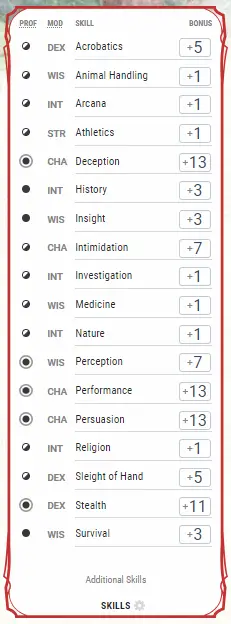By Agatha Devere, a chaotic evil staff writer
Is it bragging, strategizing or metagaming when I tell my fellow adventurers: “I have a +13 to persuasion and deception – let me do the talking!”
“I can’t roll less than a 23”
What is wrong with sharing your character’s skills with your fellow players? Aren’t you supposed to be working together?
I have this really awesome College of Eloquence bard. Her name is Mort T’kaenen. With her silver tongue feature, she can’t roll less than a 23 on either persuasion or deception. Don’t you think that is something my fellow adventurers should know?

Strategizing or Metagaming? – It Depends
Every D&D player, and every Dungeon Master, has their own comfort level when it comes to metagaming. They can also have different opinions on how detrimental it can be to a game.
Metagaming is a term used in role-playing games. It happens when a player uses real-life knowledge about the state of the game to determine their character’s actions. However, it only becomes an issue when that in-game character has no relevant knowledge or awareness under the circumstances. Metagaming is an example of “breaking character” – as that character makes decisions based on information they don’t actually have.
– Common knowledge (and Wikipedia)

Photo by Gabriella Clare Marino on Unsplash
Metagaming can ruin the “suspension of disbelief” that makes role-playing games so much fun. Anything that pulls the collective consciousness of the players out of the game and back to reality can mess with the immersive experience.
But it still happens all the time. DMs metagame. Players metagame. It’s just a matter of how much metagaming is acceptable or allowed, at any given table.
How much stat sharing is too much?
I am lucky to be a member of a small Discord server where I am able to talk D&D with fellow DMs and players quite often. During a recent group gab, I mentioned wondering why more players don’t openly ask their teammates what their “scores” are – their skill modifiers, etc. I was surprised to learn that, for some people, that is a no-no.

Image courtesy D&D Beyond/Carla Bumstead
My friends’ argument for not sharing stats like ability scores etc. is that that stuff is clearly out-of-game stuff. For example, George the gnome rogue does not know he has a +7 stealth. Yes, he knows he is really good at being sneaky. But according to my buddies, when you start throwing out numbers in the middle of a game, you’re metagaming and you should stop.
Strategizing or Metagaming?
Numbers, stats, modifiers, dice rolls, etc. are talked about all the time in a game of D&D. It’s part of the game! Does it really matter if George the rogue says “I am super good at sneaking” or “I have a +8 to stealth”? In my opinion, in most cases, it does not. As with much in D&D, it depends on both the situation and the DM. But it is not that bad of a sin if it does happen.

Photo by Carla Bumstead
The “open table” DM
If you are the type of DM that sometimes share rolls with your players – and openly talks about armor class, strength scores, or even a monster with “a lot of HP” – you are technically metagaming. You are freely acknowledging you are all playing a tabletop role-playing game throughout the actual gameplay. So what? For some, this approach works very well. Personally, I love it. It allows players to take all kinds of ownership of the game and greatly enhances the collaborative story-telling part of D&D.
The Immersive DM
However, there are other styles of DMing just as valid as the “open table” DMing style summarized above. These types of DMs like and want their players to fully immerse themselves in their characters, to be their characters throughout the entire game session. It can really take the concept of “fantasy role playing” to another level. At an immersive DM’s table, everyone takes the suspension of disbelief very seriously. Metagaming, especially when someone starts talking about modifiers, can ruin the whole thing.

Image courtesy Carla Bumstead
If my silver-tongued bard should ever find herself at an immersive DM’s table, she better shut up about her +13s. Instead, she should simply say: “Excuse me, but I have been told I have a silver tongue, do you mind if I talk to the barman about free drinks?”
Feature photo (the Korean War Veterans Memorial on the National Mall in Washington, D.C.) by Carla Bumstead.






I would say it’s about the experience… the experience of those playing AND the experience you/each player wants.
If the group, or there are players in the group who are very new to letting their stats inform their game play = role playing (gamified) then using the numbers to explain/inform player’s actions helps newbies understand HOW to role play in a role playing game…. So numbers are a tool, (&and a toll) when teaching/learning how to role play. This method exists to help those unfamiliar with transitioning from right brain game play to left brain storytelling.
However once playing in an assembled group, within which each member understands the joys of role playing and seek to maximize that (yes, it’s “Immersive”) experience, numbers in the narrative hinder that effect. Once the table’s synergy is excited and the narrative torch is being passed from player to player to DM to player, creating a compelling co-authored story that usually only exists within everyone’s real time collective imagination; announcing that one has a plus 13 to persuasion becomes akin to nails on a chalkboard… or a serious scene that suddenly includes pig-latin… we understand it, we know it means the same thing, but we had to think about that, translate it for ourselves— switch from left to right brain, and back again.
Thanks for your comment – a lot of excellent points!